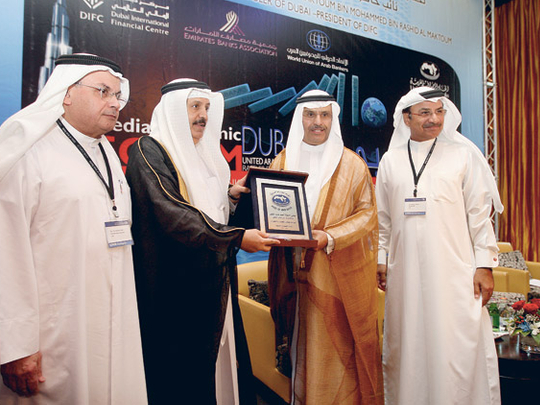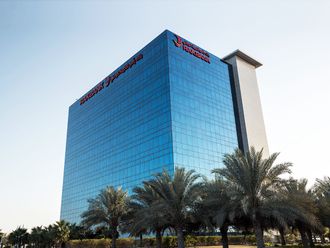
Dubai: The UAE's banking sector is adequately liquid and the capitalisation levels are far in excess of Central Bank requirements, thus the banking sector will not require Central Bank support, said Ahmad Humaid Al Tayer, Governor of the Dubai International Financial Centre and Chairman of the Emirates Banks Association.
Speaking to reporters on the sidelines of a conference on the media's impact on the Arab banking and financial sectors Al Tayer said the timely intervention of the federal government and the UAE Central Bank helped the banks to meet the capital and liquidity requirements during the financial crisis.
In response to the liquidity squeeze that began in the third quarter of 2008, the UAE Central Bank guaranteed all bank deposits for three years and provided a Dh50 billion liquidity support. The Ministry of Finance injected Dh70 billion of deposits, which it later agreed to be converted into subordinated debt, and the Government of Abu Dhabi injected Dh16 billion of Tier 1 capital into the five largest banks based in Abu Dhabi.
Steady improvement
"The financial sector has witnessed a steady improvement in the levels of liquidity and capital adequacy exceeding the requirements of the Central Bank and Basel 2, despite the high provisions taken," said Al Tayer.
Latest data from the UAE Central Bank showed that the combined shareholders equity gained nearly Dh24 billion in the first half of 2010 to around Dh255 billion at the end of June against Dh231.4 billion at the end of 2009. The increase boosted the banks' collective capital adequacy to 20.4 per cent.
Speaking about the role of the media in economic activities in the country and the region Al Tayer said the media has the ability to reach a mass audience and influence it with the critical messages and important information it carries.
"Today media impact is instant, as we live in a world where news, information and comment are up to date and easy to receive. We cannot ignore or underestimate the role and importance of the media and the impact it has on moving markets, banks, finance and the wider economy. This is especially true when the media succeed as a pressure group in transforming important topics into issues of public opinion," he said.
Al Tayer called on the media to be objective and responsible in reporting. "Financial media is very much a "double-edged sword." The responsibility which the media bear is great; they have a duty to report both ethically and accurately and to investigate the accuracy of the news they are reporting."
Adnan Ahmad Yousuf, Chairman of the Union of Arab Banks, called on all banks and financial institutions operating in the region to co-operate with the media in getting accurate information to the public.
"The financial media in the region, like their counterparts elsewhere in the world have the responsibility to reach correct information and analysis to the public. I urge all the institutions in our region to equip the members of the media with adequate information to do their duty with diligence," said Yousuf.
Speakers at the forum urged both the media and businesses to work closely to bring more accuracy in financial information available in the public domain. "The role of financial reporting in the region became extremely important during the financial crisis. Going forward, all stakeholders in business and finance should make an effort to reach news and analyses based on facts to the public," said Sulaiman Al Mazroui, UAB Board Member and General Manager of Emirates NBD.
Ethics
Al Tayer called on members of the media to be ethical in their reporting and opinions. "We all remember how the Western and Arab media has mobilised all its resources to cover the effects of the financial crisis on Dubai creating a negative aura of uncertainty around all aspects of life in Dubai. To be frank, I was surprised by the size of that media campaign and I have my doubts about the real objectives behind it as well as its merit."












